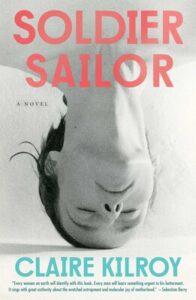
Necessary Yet Invisible: On the Unpaid Labor of Motherhood and Writing
Claire Kilroy Considers Women’s Work at Home and on the Page
My novel, Soldier Sailor, was recently shortlisted for the Women’s Prize for Fiction. When I started writing, I did not fully appreciate the need for the Women’s Prize. Creativity, unlike sport, was not limited by physical strength or speed. A woman could write as well as a man. Did this prize suggest that women were somehow weaker writers than men?
Then in 2012 I became a mother. Just as a gender pay gap exists for full-time work, there’s a pay gap in what women are paid by publishers for their work, and that hit me hard. The advance for the novel I published that year would pay for ten months of childcare, but the novel had taken me over three years to write. Ever since, I have been grappling with the massive dissonance between how easy I anticipated motherhood would be, and how challenging and profound it is. I thought I could just write with my baby beside me. How could I have been so misguided?
Motherhood is a reckoning with mortality, profundity, extremity, nobility—you will find resources you never knew you possessed.
Just as the world of medicine evolved through studies of the male body, the world of literature evolved through meditations by the male mind. Most of the canonical novels I read as a young woman were told from the point of view of straight white males, to the extent that I appear to have internalized that voice as the voice. The straight white male’s perspective is the perspective, even on my own life. I see the world his way. And he doesn’t quite register female endeavor, female emotion, female grief.
Take Updike’s Rabbit, Run. A heavily pregnant woman is dumped by her husband for another woman who works part time as a prostitute. The jettisoned wife gets despairingly drunk some months after giving birth, accidentally drowning her baby at bathtime, while the new girlfriend is impregnated but then abandoned by the man. Yet the novel is still about him and his disappointment at not being a baseball star?
There are novels that are right, and there are novels that are wrong. I first read Toni Morrison’s Beloved as a teenager and instinctively knew, even at that age, that a mother would kill her child to save her from slavery. Beloved is a right novel. Cormac McCarthy’s The Road featured a mother who killed herself to escape being raped and eaten. This is a wrong novel. The mother would kill her child first, not render him motherless before being raped and eaten.
We were the first generation of Irish girls who were expected to have careers. Motherhood wasn’t mentioned as a life choice in school. A priest was dispatched to warn us not to get pregnant (“They’d put it in a keyhole, girls. Don’t let them put it into you.”) I remember driving my first car to my first job looking out at women with buggies and thinking, Yes, I have escaped! I have more important things than this to do with my life! The patriarchy tells us that caring—whether it be for infants, for the elderly, the disabled, for whoever needs it—is basic and dull. That’s why it is lowly paid, if there is payment at all. Hence it is left to women.
I feel hot shame for having underestimated those middle-aged daughters bringing their elderly parents to medical appointments, the flustered mothers being screamed at by toddlers in supermarkets, the wives perennially trying to plan nutritious family meals that her family won’t actually eat. Nobody had told me it was so hard. This misconception left me with a sense of failure that was both chronic and acute, depending on the domestic crisis of the hour. I, who had lived by Beckett’s Fail again, fail better principle—I thought I knew failure. Any clown could raise a child, apparently. Any clown but me.
Why the surprise? We may not all be mothers but somebody raised us.
In the run up to the UK publication of Soldier Sailor last year, The Guardian asked me to do their Top Ten Books slot. I chose the Top Ten Books about being the mother of an infant. The Infancy Infantry, I was going to call it. However, I couldn’t find ten novels about motherhood during the infancy years. I could only find five, either because they haven’t been written (mothers of small children are exhausted), or because they got no attention and disappeared. Or perhaps such novels simply never make it into print.
My previous American publisher couldn’t see a way to successfully publish Soldier Sailor in the US (Scribner later acquired it). One understands oneself in no small part through the books one reads. If the canon is dominated by men who display a limited understanding of women, it stands to reason that life with an infant should come as a shock. In the end, I had to give my Guardian article the more generalized title of Top Ten Motherhood Novels.
A woman can write as well as a man but not if one of her hands is tied behind her back.
Despite the ideology telling us the real business of life (and literature) happens out there in the world, the opposite holds true. Once you give birth, it’s the stuff out there that looks easy. Motherhood is a reckoning with mortality, profundity, extremity, nobility—you will find resources you never knew you possessed. Every night will be a long dark night of the soul. It will be funny, it will be sad, it will at times be frankly mental. This is the real world, in here. It is also the place of art.
But it takes it a toll on you.
Some reviews of my novel have commented that I took time out to raise my child. Not true. I began writing Soldier Sailor when my baby was a few months old. It took eleven years to finish. It had taken twelve years collectively to write my first four novels, and that’s without working anywhere near as hard. Yes, a woman can write as well as a man but not if one of her hands is tied behind her back. I am sick of talking about motherhood. I want to be talking about parenthood but we are not there yet.
You may not be a mother but if you are a woman, the duty of unpaid caring will come to your door in some shape or form—picking up a neighbor’s groceries, driving your elderly relations around, listening, cleaning, planning. This work is crucial for the common good but it will take you away from your desk, and you’ll have a million things to worry about, which will affect your concentration, however you will grow to understand other people like you never did before, which will make you a more nuanced writer when (or, oh god, if!) you make it back to the page.
As Kate Mosse says: Women step up. Mosse founded the Women’s Prize for Fiction not because the Booker Prize shortlist in 1991 was composed solely of men, but because nobody noticed. So bring on the Women’s Prize, bring on all the prizes that acknowledge the obstacles women must overcome as well as the profoundly necessary yet invisible work they do, because if women write about this work, if they depict it, then we can see it. Which makes it that bit harder to dismiss.
__________________________________

Soldier Sailor by Claire Kilroy is available from Scribner, an imprint of Simon & Schuster.
Claire Kilroy
Claire Kilroy is the author of five novels including Soldier Sailor, All Summer, Tenderwire, and The Devil I Know. She was awarded the Rooney Prize in 2004 and has been shortlisted for many other prizes, including the Irish Novel of the Year and the Kerry Group Irish Fiction Award. She studied at Trinity College and lives in Dublin.



















